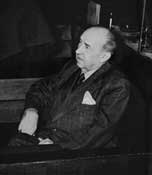Walter Funk
(1890 - 1960)

Walter Funk was born into a merchant family in Königsberg, East Prussia. He studied at university in Berlin, covering a number of subjects. In World War I he joined the infantry but was discharged as unfit for service in 1916. Following the war he worked as a journalist and in 1922 he became the editor of the center-right financial newspaper the Berliner Börsenzeitung.
Funk resigned from the newspaper in 1931 and joined the Nazi Party, becoming closer to Gregor Strasser who arranged his first meeting with Adolf Hitler. Partially due to his interest in economic policy, he was elected a Reichstag deputy in July 1932 and, within the party, he was made chairman of the Committee on Economic Policy in December, 1932; a post that he did not hold for long. After the Nazi Party came to power he stepped down from his Reichstag position and was made Chief Press Officer of the Third Reich.
In March, 1933, Funk was appointed as a State Secretary at the Ministry of Propaganda.
In 1938, he assumed the title of Chief Plenipotentiary for Economics (Wirtschaftsbeauftragter).
He also became Minister of Economics in February of that year, replacing Hjalmar Schacht who had been dropped in November 1937. Schacht had been dismissed in a power struggle with Reichsmarchall Hermann Göring, who was quick to tie the Ministry more closely to his Four Year Plan Office.
In January 1939, Funk gained another credit to his name when he assumed the post of President of the Reichsbank, again replacing Schacht.
He was appointed to the Central Planning Board in September, 1943.
Despite poor health Funk was tried with other Nazi leaders at the Nuremberg Trials. Accused of conspiracy to commit crimes against peace; planning, initiating and waging wars of aggression; war-crimes and crimes against humanity, he argued that, despite his titles, he had very little power in the regime. Göring described Funk as "an insignificant subordinate," but documentary evidence and his wartime biography Walter Funk, A Life for Economy were used against him during the trial, leading to his conviction on counts 2, 3 and 4 of the indictment and his sentence of life imprisonment.
Funk was held at Spandau Prison along with other senior Nazis. Released in 1957 due to ill health, he died three years later.
Sources: Wikipedia Encyclopedia. This article is available un the GNU Free Documentation License


